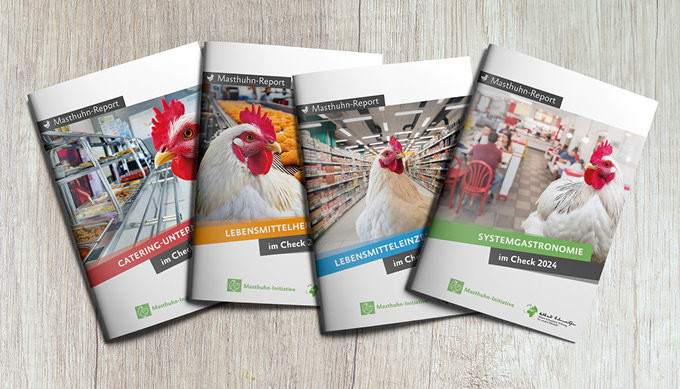
In 2023, over 626 million chickens raised for their meat (so called broiler chickens) were slaughtered in Germany – more than five times as many as pigs, cattle, turkeys, »laying hens« and all other land animals combined. Although awareness of animal welfare is on the rise, so is poultry consumption. This increases the pressure on companies to improve conditions for the animals in their supply chains. In 2024, we therefore expanded The Pecking Order to include further important players from across the food industry and assessed meaningful steps towards better animal welfare.
Food Retailers: Using Market Influence to Become Leaders of Change
For the first time, this year’s report includes a detailed analysis of food retailers. Since Aldi Nord and Aldi Süd joined the European Chicken Commitment in 2020, several other major retailers, including the Rewe Group and Lidl, have committed to raising welfare for broiler chickens. Given the rising consumer demand for animal welfare, we expect Edeka and Kaufland to follow soon. Retailers can meet their consumers expectations by publishing public roadmaps and detailed reporting. We hope to see widespread use of these transparency tools to drive measurable progress across the industry.
Contract Catering: A Model for Commitment
The contract catering sector is making strides in broiler welfare. All ten companies evaluated are part of the European Chicken Commitment stipulating improved standards for chickens by 2026. However, we expect them to apply a more structured approach to ensure that improvements are implemented across the companies’ entire product ranges. None of the companies we looked at have yet shared public roadmaps and the published reports are lacking in detail. By increasing accountability, the sector is in a better position to meet its 2026 target.
Food Manufacturers: Playing a Key Role in the Supply Chain
Food manufacturers hold a vital position in the food industry – and their engagement is essential in enabling higher animal welfare standards. The sector is very diverse. However, all of these different manufacturers need to become active to drive change. While 22 manufacturers in Germany have joined the European Chicken Commitment, progress in reporting remains inconsistent. Only two of the eleven assessed companies shared detailed progress reports, five companies have not published any updates this year or last. Only one company received some points for publishing a roadmap.
Fast Food Chains: Proving that Standards Are Achievable
When it comes to the fast food sector, Hans im Glück leads by example: by complying 100% with the European Chicken Commitment, the franchise company operating almost 100 burger grills shows that higher standards are attainable. Ikea and KFC have also made progress, starting to reduce stocking density and adding enrichment materials to improve animal welfare. Despite these first steps, our report reveals that most fast food companies are lagging which highlights the need for quicker adoption of standards across the sector.
Creating a Sustainable Market Shift
While the 2024 Pecking Order shows that there is some progress, it underscores the need for faster and more transparent actions. The European Chicken Commitment’s criteria offer practical guidance for companies, tackling issues like overcrowding, health problems, and breeding-related injuries. With over 100 companies in Germany now working towards implementing these standards, the Albert Schweitzer Foundation is helping companies establish more sustainable supply chains and meet growing consumer demand for more humane practices.
Together, we can build a market where higher animal welfare and sustained progress go hand in hand.